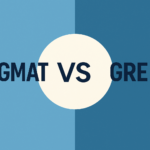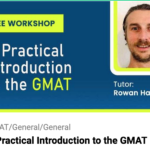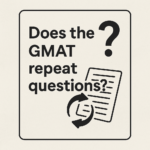My Recommended GMAT Materials and Companies
GMAT materials vary a lot in quality. Let me emphasize: a lot.
Actually, I really don’t even like the question of what GMAT materials I would personally recommend. I’m sort of writing this article under duress because I get asked the question so often.
Honestly, I give my clients my own proprietary notes and request that they steer clear of anything except Official GMAC (GMAT Official Guides) materials as much as humanly possible.
That said, I don’t mind if other materials are used as an adjunct. This is a list of some of the materials and prep companies whom it might be worth checking out if you’re really keen on not listening to me.
I’ll put the information into several categories. As a note, all the Official Guide links are affiliate links, but none of the rest are. I am supporting the Official Guide, but there is no monetary incentive for me implied or received with regard to any third-party materials, and I like it that way.
The Order of Materials
All that said, there exist a few books and programs that are:
1) What I’d actually recommend to anyone.
2) Legitimately helpful with a few caveats.
3) A few that won’t hurt but probably won’t help.
4) Honestly, I couldn’t tell you.
5) All the rest, which are classified as “kill it with fire.”
Let’s take a tour through the first four groups and I’ll leave it to you to fill in the blanks for Group 5.
Pro tip: if it starts with “E” it’s time to break out the flamethrower. Just saying.
1) The Official Guide — The OG of GMAT Materials
Why oh why would I suggest using the Official Guide? First, the obvious thing: these are actual, retired GMAT questions. No one spends the time or money on developing materials that the Graduate Management Admissions Council does.
These questions are OG questions because they are gangsta. Often replicated, never equalled.
These questions are finely-crafted jewels that have literally thousands of dollars more development work per question than anyone else’s materials. That’s why you don’t have to worry that one in ten questions is a bit weird or dodgy (OK, sometimes one in five).
With Official Guide questions, you know that the answer in the back is correct. That said, the questions are simply presented in no discernable order by topic; there is a vague “they get harder as the book progresses” thing going on, but even that is a bit questionable given that some early questions are pretty fierce and some late ones are pretty tame. The problem is that figuring out how all these problems work can be simply talmudic in its complexity.
But there are explanations! Why yes there are. Thank you for pointing that out. However, the first thing you’ll realize in reading the explanations is that they are as clear as a tall glass of milk.
That is, the explanations leave something to be desired. To be perfectly honest, I don’t look at them unless I really need to confirm a suspicion on something. The Quant explanations are either too convoluted, crossing all the Ts and dotting all the Is (which is often unnecessary on GMAT), and the Verbal explanations too often write off things that don’t make immediate sense or don’t explain why certain tempting answer are not in fact preferable to the correct answer.
Now a certain amount of effort has been made on GMAC’s part to remedy this, and in particular, the Official Advanced Questions does in fact have good explanations! But for the rest of them, don’t hold your breath.
Now: if you’re looking for extra Official questions, you can quite easily find the big Official Guides dating back to 2005 on Amazon some questions are the same, but many are different. There will be a minimum 10% difference between any two different OGs. The links are here:
–2022 –2021 –2020 –2019 –2018 –2017 –2016 –2015 –13th Edition (2012; same as 2015 with a different cover) –12th Edition (2009) –-11th Edition (2005!)
NB: lots of people say “Original Guide” rather than “Official Guide.” I don’t know why this is, but I have fired clients for saying “Original Guide” before. To me, it’s a bit like purportedly educated people still saying “haytch” instead of “aitch.” You will not work with me if you make such errors because it would be pointless to expect a reasonable GMAT score should you do so; be warned.
2) Legitimately Helpful (with Caveats)
Target Test Prep – Detailed Deep-Dives by Experts
These guys are serious about helping people and the TTP platform offers a great deal for the money. The materials are good and the explanations are good.
TTP questions are third-party questions and subject to my qualms about any third-party question: they don’t have the editing that an OG question does. That said, TTP does take editing seriously, so the delta between these and OG questions will be smaller than at most places.
One thing I can say is that TTP is a huge volume of material and might even go too granular in certain cases, especially for Quant. It’s not necessarily my style, but it might be yours.
Conclusion: They offer a 7-day free trial, which is worth checking out. See if it works for you. Recommended.
Manhattan Prep – Best One-Stop Shop
Remember Andrew Yang? He used to be CEO of Manhattan Prep. Not every company was run by a presidential candidate. Except Bain, I guess, and the Clinton Foundation. Never mind. Oh, wait. But get this: what about a presidential candidate who didn’t suck? Manhattan Prep FTW, yo.
That said, you don’t have to be part of the Yang Gang to get good use out of Manhattan Prep’s excellent materials. They have a tendency to say that all sorts of things are set in stone when that might not be true past a 730-ish level, but largely it’s good material to get you up to a 700-ish score.
The practice exams give scarily-accurate scores compared to the real GMAT.
Got a Q47 or higher? I highly suggest you invest in the redoubtable Manhattan Advanced GMAT Quant. Don’t mess with this if you’re lower than that, or you’ll burn yourself.
Caveats: the Verbal questions really don’t read like Official Verbal questions. Somewhere between 1 in 5 and 1 in 10 of them will tend to have a very questionable answer. It’s up to you to read enough OG questions to understand where these questions fall short.
The Quant questions, if anything, tend to be slightly more difficult than Official Quant questions. You desperately need to use this in conjunction with OG questions, because you simply can’t walk into the actual GMAT having only ever used Manhattan Prep materials and expect to convert on the fly.
Conclusion: Manhattan Prep is your friend, if used wisely.
Magoosh – This is a great platform.
I actually looked into getting into a referral deal with Magoosh once, and their marketing person turned out to be a salesperson who told me to buy ten year-long subscriptions at a 10% discount that I could then sell on to clients (presumably to make the 10% back by selling on to my clients at the same price as Magoosh itself?) rather than offering me a percentage referral. Essentially, I was offering this individual guaranteed referral cheddar and said individual was offering me proof that this self-same individual is, in point of fact, an idiot.
And yet I still recommend Magoosh! That’s how much I like this platform. They’re bad salespeople and shameless money-grubbers, but the content is top-notch.
Excellent sample questions. Even the Verbal ain’t too bad. Very good demonstration videos as well. It might peter out at the 700+ level, but as an adjunct to some real study from your trusty OG, it gets my OK–and it’s a great price for what you get.
Conclusion: Well worth considering use alongside OGs, particularly for people starting sub-600.
3) Not Helpful, Not Harmful
Kaplan – Kaplan’s stock-in-trade is getting people who are below 50th percentile to 50th percentile (or perhaps just above). If you are shooting for more than a 620 or so, then you can largely ignore this stuff.
If, however, you’re at a 480 and you need to hit that 580-620 before you start wearing Big Boy Trousers, then maybe there’s a place for Kaplan.
Worst case, it won’t hurt you. They put a fair amount of money into question development and editing and the Verbal stuff isn’t bad.
I’m not sure whether they’re even running courses in London anymore, but presumably they’ve hired some grad student for £25 an hour to teach privates that they charge £180/hr for. You do the math on what you’re getting out of this.
Princeton Review – It’s the shittier version of Kaplan! Nothing special here. I think the guy who founded it was on the Tim Ferriss Show once. No Andrew Yang, let me tell you.
Again, it won’t harm you.
Veritas – Similar in its inferiority to Kaplan, but they have branded themselves well enough for people to have heard of them. Mostly harmless (as some would describe planet Earth).
NB: the Verbal is especially crap. I feel really bad because they make one of their poor tutors go and justify the bad Verbal questions on GMATClub, which is sort of hilarious given that the questions themselves are actually the problem.
4) Honestly, I Couldn’t Tell You
>Manhattan Review – (NOT to be confused with Manhattan Prep, which is dope) – Dude, what the hell is this place? They obviously put a lot of money into SEO and they have published a few books on Amazon, but I have no idea what the hell this company is.
Apparently it’s Belgian or something? I don’t know; in any case, it sounds far too much like a dubious continental agency I once worked for and don’t put on my CV. Not the same place, but I can only imagine…
I’ve been in the GMAT space since 2005 and I have worked with clients or fellow tutors who have take a course from or taught just about anywhere I can imagine. I’ve met scores of tutors through GMAC conferences.
NEVER ONCE have I met anyone who has taken a course with these people or who has had any dealings with them whatsoever. I simply do not know. I can’t make a judgment based on a lack of information, but I can sure as shit judge the fact that I don’t have any useful information here.
My judgment: caveat emptor. If you decide to roll the dice, please report back to me. I’m honestly curious.
5) Kill It With Fire
Yo! If I didn’t mention it here…










